Hayati Özer renovated its production lines and incorporated state of the art technologies with a level of precision and stability. Hayati Özer plans to continue with this investment strategy in the future in order to remain at the leading edge of dried fruits sector. Our dried seedless sultanas are directly collected from the Aegean region of Turkey by the professional experts and processed in our high technology facilities.
Hayati Özer has in place leading industry best practices at all levels of the supply chain. These practices ensure that we are able to supply exceptional quality dried products via:
Harvesting
Starting in late August and continuing through September, the grapes are harvested.
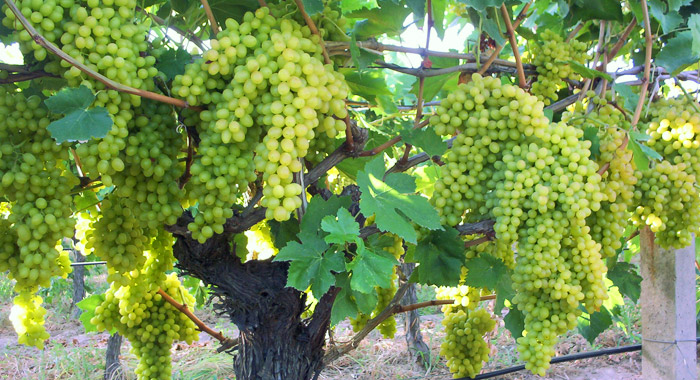
The grapes are hand-picked into the container (“dip tins” or “buckets like plastic baskets”). The most commonly used containers are made of sheet steel and plastic baskets have perforated bottoms and sides to allow free flow of dipping lye through the fruit during dipping. No mechanical harvesting of fresh grape, for drying purpose is being used. The vines are grown under controlled conditions and the grapes harvested and dried under supervision of Hayati Özer’s own Research and Development Department. Fruit selected for processing consists of good, sound berries, typical of the crop which have been sun dried.
Dipping & Drying
Depending on the weather, the grapes are allowed to dry on the trays for two to four weeks. During this time, the moisture content of the grape is reduced from 75% to under 15% and the color of the fruit changes to a dark reddish brown.
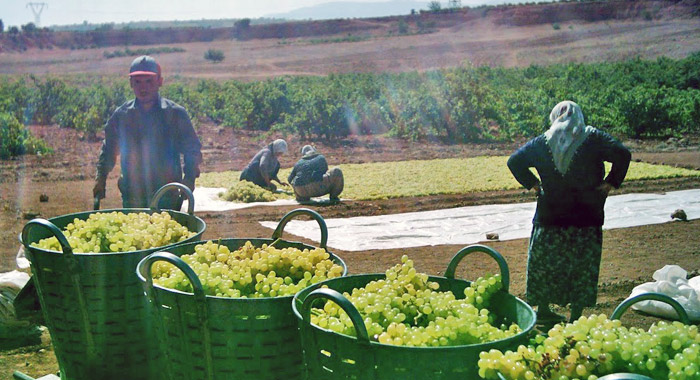
Product that is to be marketed as Sultanas is set aside for dipping in potassium carbonate which will be helpful for the Hygienic Drying with short time and all the required vitamins and minerals of the produce along with natural color is protected well.
Early in season, Sultanas may be dried by simply placing them out in the direct sun, without any pre-drying treatment. In this way “naturals” similar to American Thompson Seedless raisins are produced. They are dark reddish brown, with bluish tinge due to the bloom, and have a distinctive flavor.
All of the harvested fruit is then stored in satisfactory conditions before further processing.
Washing
The raisin bought from farmers is stored in special depots.
As the first step of processing, the fruit is treated with fresh water.
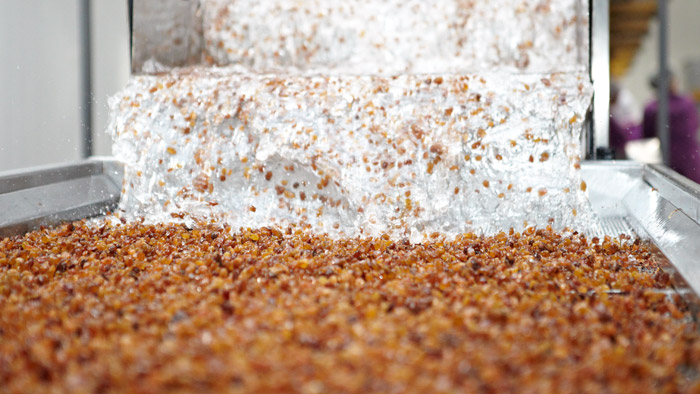
In the first stage of washing process the raisin is transferred to first screen by a spiral machinery in which it takes its pre-washing stage, too. Treating the grape with water in order to clean them off stone, chip and other foreign material. Washing process is performed in double stage in our plants. 3-6 ppm chlorine is contributed in washing water in order prevent microbial activities. The grapes being stored on wire mesh shelves after washing are left for resting 24 hours long. If whitened grape was requested, wire meshes are taking in sulfuring rooms and sulfuring treatment is applied to grapes.
Resting
In the next stage raisins are gathered in baskets in order to be rinsed and then they remove to the drying system. In this stage raisins are dried until they reach to the standard degree of moisture.
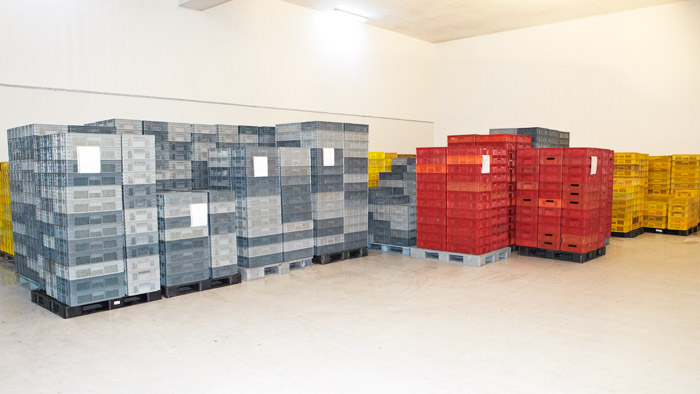
The grapes being stored on wire mesh shelves after washing are left for resting 24 hours long. If whitened grape was requested, wire meshes are taking in sulfuring rooms and sulfuring treatment is applied to grapes.
Laser & X-Ray Scanning
This is a process further aided by the use of modern Laser & X-Ray scanners
to ensure a product which is truly ready-to-use.
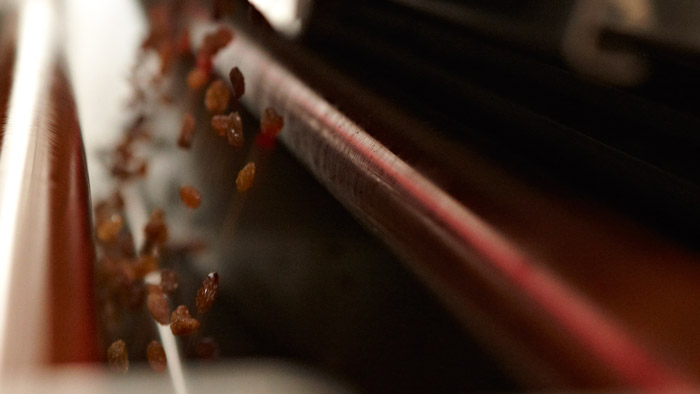
In the production stages, raisins are double washed, elaborated, stemmed, capstemmed, brushed, sized, mechanically cleaned and then taken to laser scanning and X-Ray sections. With the help of latest technology available, impurities such as stalks, stems and stones are eliminated by laser scanners as well as X-Ray sorters. Several checks are carried out at critical points during the course of production.
Hand Sorting
Which is done by workers to be sorted respecting damaged, mouldy, mechanically damaged, calamity, sugarized, infection, seedy and infection berries and also stones and sands.
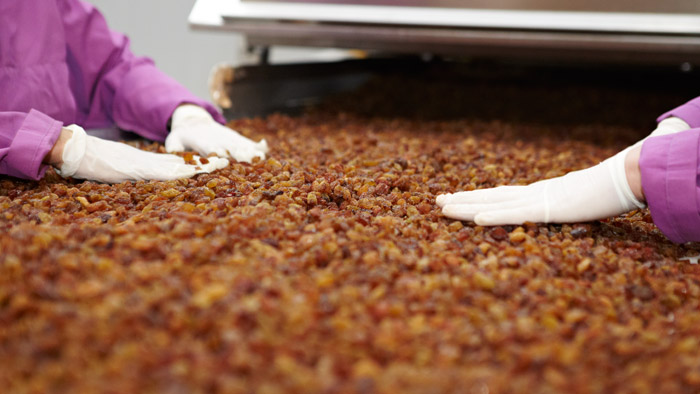
The grape after the previous described stages is involved in the manual inspection by the workers on the vibrating sorting table. At this stage again any kind of impurities such as the waste, petiole, rotten grain, pebbles is cleaned out manually.
Weighing, Packing and Shipping
Mechanized Packing Line will pack the final product after X-ray inspection machines and metal detector.
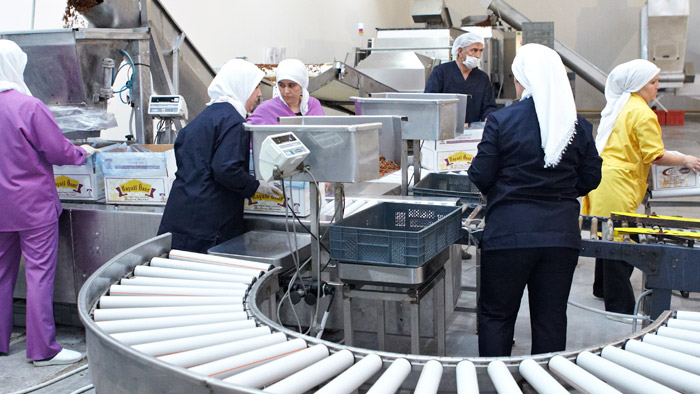
The exact specification of the final product can be tailored to the demands of the buyer by skilled workers operating in a brightly lit, hygienic environment. Export cartons are telescopic with blue polyethylene liners available in various net weights. The factory also produces retail packs in all sizes from 250g pre-printed to the buyer’s requirements.
All of the packed fruit is fully metal detected and traceability is assured using bar-coding. The final product is stored in Hayati Özer's own warehouses under tightly controlled conditions.









